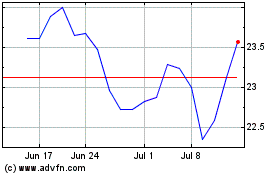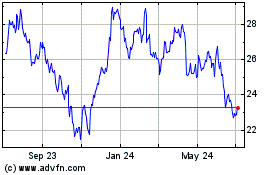Steelmakers Suffer Worst Slump in a Decade
April 19 2020 - 8:29AM
Dow Jones News
By Bob Tita
U.S. steel companies are slashing production to match a sharp
collapse in demand caused by manufacturers idling plants to slow
the coronavirus pandemic.
The U.S. steel industry has fallen into its most severe downturn
since the 2008 financial crisis. United States Steel Corp.,
ArcelorMittal and other steelmakers are ratcheting back output and
shedding workers, anticipating that orders and prices will fall
further.
U.S. mills are operating at 56% of capacity, down from 80% in
2019, according to the American Iron and Steel Institute, and steel
output across the country has fallen by a third in three weeks. The
spot-market price for hot-rolled coiled sheet steel is $485 a ton,
off 18% from a month ago and down nearly half from a recent high in
July 2018.
"We're in for a rough ride," said Bill Douglass, a regional
president for Lex Group, a steel distributor in Illinois. "There's
nobody who's unaffected."
Industry executives and analysts expect production to drop
further, even as manufacturers reopen plants. High stockpiles at
distributors will likely be drawn down before companies place new
orders, said Credit Suisse, which expects sheet-steel demand to
plummet 50% in the second quarter from a year ago.
When orders do pick up, executives expect that businesses will
spend less and that high unemployment will weigh on demand for
autos, construction materials and energy equipment. Those
industries account for 82% of domestic sheet-steel consumption,
according to market consultant Metal Strategies Inc.
"The big three markets have fallen flat on their face," said
David Stickler, chief executive of Big River Steel LLC in Arkansas.
U.S. Steel bought a 50% share of Big River last year with a
deadline of 2023 to purchase the remaining share for $700 million.
U.S. Steel CEO David Burritt has described the acquisition as the
company's top strategic priority. A spokeswoman said there has been
no change in the acquisition plan.
ArcelorMittal, U.S. Steel and Cleveland-Cliffs Inc., formerly
known as AK Steel, are heavily dependent on auto-industry
customers. A month of idled car production across the U.S. will
cost the steel industry at least $1 billion in revenue, Metal
Strategies estimated. Crashing oil prices are discouraging
frack-drilling companies from starting new wells. The number of new
wells started in the U.S. is down 48% from a year ago and 27% since
the end of March.
U.S. Steel idled about two-thirds of its pipe business in March,
closing plants in Texas and Ohio. During two weeks in March,
customers of South Korea's SeAH Steel Corp. canceled orders for
25,000 tons of pipe, said Kirk Murray, the company's U.S. general
manager.
"Our pipe inventory is now massive," he said. Demand had been
weakening for a year before the market collapsed, he said. SeAH
last week laid off about 30 of the 250 workers at its Houston pipe
plant.
"There's more struggles to come," Mr. Murray said. "This is not
going away."
U.S. Steel, which was recording losses before the sudden
downturn in the steel market, has been one of the more aggressive
steelmakers in cutting costs. Last month, the company trimmed its
capital-spending budget for this year to $750 million from $875
million to preserve cash. It indefinitely delayed $1.2 billion in
upgrades to the rolling line for steel at its mill near Pittsburgh,
which includes $200,000 for a coal-coking plant that has been the
site of two fires in recent years and has been fined by
environmental regulators for emissions violations.
Improvements at a mill in Gary, Ind., also were suspended, and
U.S. Steel has idled blast furnaces in Illinois, Indiana and
Michigan that account for half the company's capacity to make raw
steel. With fewer blast furnaces now melting iron ore, the company
also idled one of its iron ore mines in northern Minnesota.
U.S. Steel, ArcelorMittal and other companies that rely on
labor-intensive blast furnaces tend to suffer more during market
downturns because their mills are costly to maintain even when the
coal-fueled furnaces are idled and steel production is lowered,
analysts say. The electric furnaces at newer mills operated by
competitors including Nucor Corp. and Steel Dynamics Inc. can be
quickly throttled up or down, and operate with fewer workers.
Before the downturn, Nucor, Steel Dynamics, Big River Steel and
other companies had planned to add about 8 million tons of new
steelmaking capacity from electric furnaces by 2021. That would
have increased domestic sheet-steel supply by about 10% before the
downturn.
Nucor and Big River say they haven't changed their plans. Steel
Dynamics didn't respond to requests for comment. Australia's
BlueScope Steel Ltd. earlier this month said it has delayed an
expansion at its Ohio mill to preserve cash. Adding more steel to a
weak market would hold down already depressed prices, analysts
say.
"We're small enough and nimble enough to maneuver through
difficult times," Big River Steel's Mr. Stickler said.
Write to Bob Tita at robert.tita@wsj.com
(END) Dow Jones Newswires
April 19, 2020 08:14 ET (12:14 GMT)
Copyright (c) 2020 Dow Jones & Company, Inc.
Arcelor Mittal (NYSE:MT)
Historical Stock Chart
From Mar 2024 to Apr 2024

Arcelor Mittal (NYSE:MT)
Historical Stock Chart
From Apr 2023 to Apr 2024
